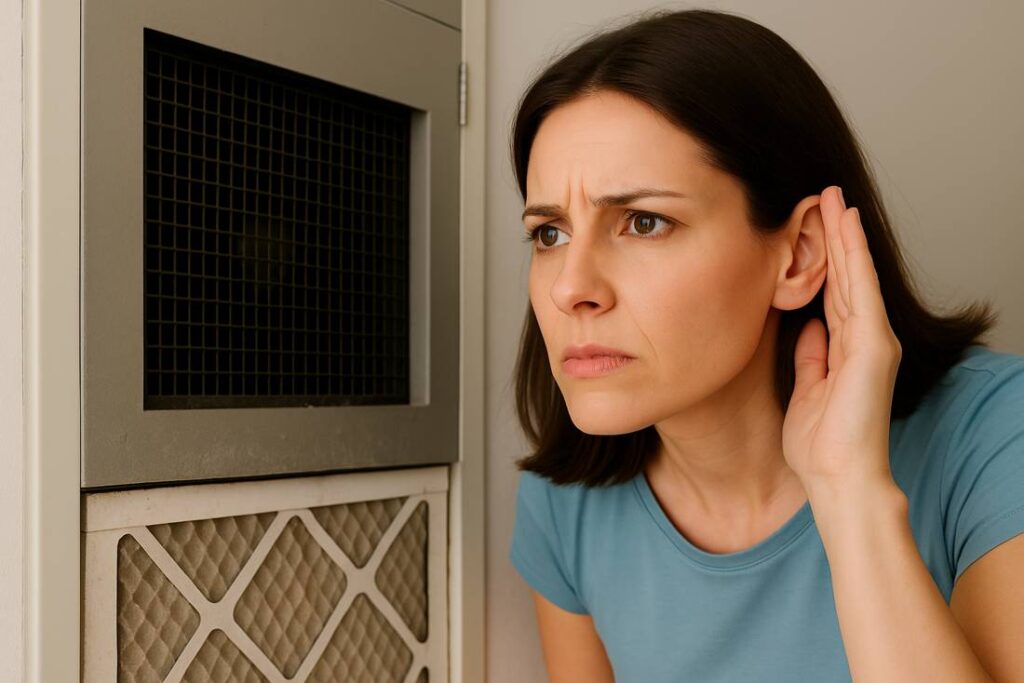Blog
Is Your AC Making Weird Noises? What They Mean and What to Do

When your AC is making weird noises, it is more than just an inconvenience. Strange sounds coming from your air conditioner often signal trouble inside the system. Whether it is a loose component, failing motor, or refrigerant leak, these noises are early warnings that something needs attention. Understanding what the different sounds mean can help you act fast and avoid expensive repairs.
Buzzing or Humming Sounds
A steady buzzing or humming coming from your AC unit usually points to electrical issues or loose parts. Failing capacitors, loose wiring, or a malfunctioning contactor often cause these sounds. While the system may still run initially, electrical problems should never be ignored. They can pose safety hazards and cause your unit to overheat or short-cycle.
If you hear this type of sound, turn off your system and contact a professional technician. Electrical repairs should always be handled by certified HVAC professionals to avoid personal injury or further system damage. This is a good time to schedule an AC repair service before the problem escalates.
Rattling or Clanking Noises
Rattling often means that something has come loose inside your system. It could be a fan blade, a bolt, or even a twig or piece of debris caught in the unit. If the rattling progresses to clanking, it might indicate that a part has broken or disconnected entirely, such as a loose blower motor or misaligned fan.
These noises typically worsen over time and can cause significant wear on your system. If you’re hearing this type of sound, shut off the unit and call for HVAC maintenance to prevent additional damage.
Banging Sounds
A loud banging noise is never a good sign. It may be caused by a broken part in the compressor or a dislodged component that is now hitting other parts inside the unit. This type of sound usually means a more serious internal problem that will not go away on its own.
Ignoring banging noises can result in complete compressor failure. Since compressor replacement is one of the most expensive HVAC repairs, it is best to have the system inspected immediately. If your system is older, it might even be time to consider AC replacement depending on the extent of the damage.
Clicking or Ticking Noises
Clicking sounds during startup or shutdown are normal. However, constant clicking while the unit is running is a red flag. This might be related to a faulty thermostat, relay, or control board.
If your thermostat is malfunctioning, it can prevent your system from turning on or off properly. Persistent clicking should be addressed to avoid irregular cycling, which puts unnecessary strain on the system. If your AC won’t turn on, and you also hear clicking, a technician should inspect the controls and wiring to diagnose the root cause.
Screeching or High-Pitched Whistling
Screeching noises often come from problems with the fan motor or the belt. While most modern AC systems are beltless, older models may still use belts that wear out or become loose. In newer systems, the sound may indicate a motor bearing issue or high internal pressure.
Whistling, especially from the vents, can point to airflow restrictions or duct leaks. These issues not only reduce efficiency but also strain your system. An inspection of your ducts, vents, and motor components may be necessary to stop the sound and restore proper function. If airflow is poor and your home is dusty, you may also benefit from air duct cleaning to remove buildup and improve performance.
Gurgling or Bubbling Sounds
Hearing gurgles or bubbling noises? These sounds are often linked to drainage issues or refrigerant leaks. A clogged condensate drain line can cause water to back up and create gurgling sounds. On the other hand, bubbling could be a sign of low refrigerant levels due to a leak.
Both issues should be addressed as soon as possible. Water buildup can lead to mold growth, and low refrigerant can severely impair your AC’s ability to cool your home. Not only will your comfort suffer, but your energy bills will likely rise. If you suspect a leak, contact a technician to check refrigerant levels and ensure proper drainage.
When to Call a Professional
While some AC noises can be resolved with basic cleaning or filter replacement, most unusual sounds are indicators of deeper mechanical or electrical issues. If your AC is making weird noises and it does not stop after a simple restart or filter check, it is time to bring in a professional.
The sooner you act, the more likely you can avoid expensive repairs or breakdowns. Many of these issues, from worn-out belts to electrical problems, are manageable when caught early. Waiting too long, however, can lead to system-wide damage that might require a full replacement.
Preventing Future AC Noises
The best way to stop AC noises from developing in the first place is regular maintenance. Routine checkups keep all components clean, lubricated, and tightly secured. Your technician will also inspect electrical parts, ductwork, motors, and more, catching potential problems before they start.
If your system is due for a tune-up, be sure to schedule seasonal service. During a regular maintenance visit, technicians will examine your system for loose parts, wear and tear, and airflow issues, giving you peace of mind during the peak cooling months.
Contact Us
If your air conditioner is making strange noises or simply not performing as it should, let the experts at FL-Air Heating and Cooling help. Our experienced technicians will inspect your system, identify the issue, and get your home back to cool comfort quickly. Call us today at 813-800-2665 to schedule an inspection or repair.








